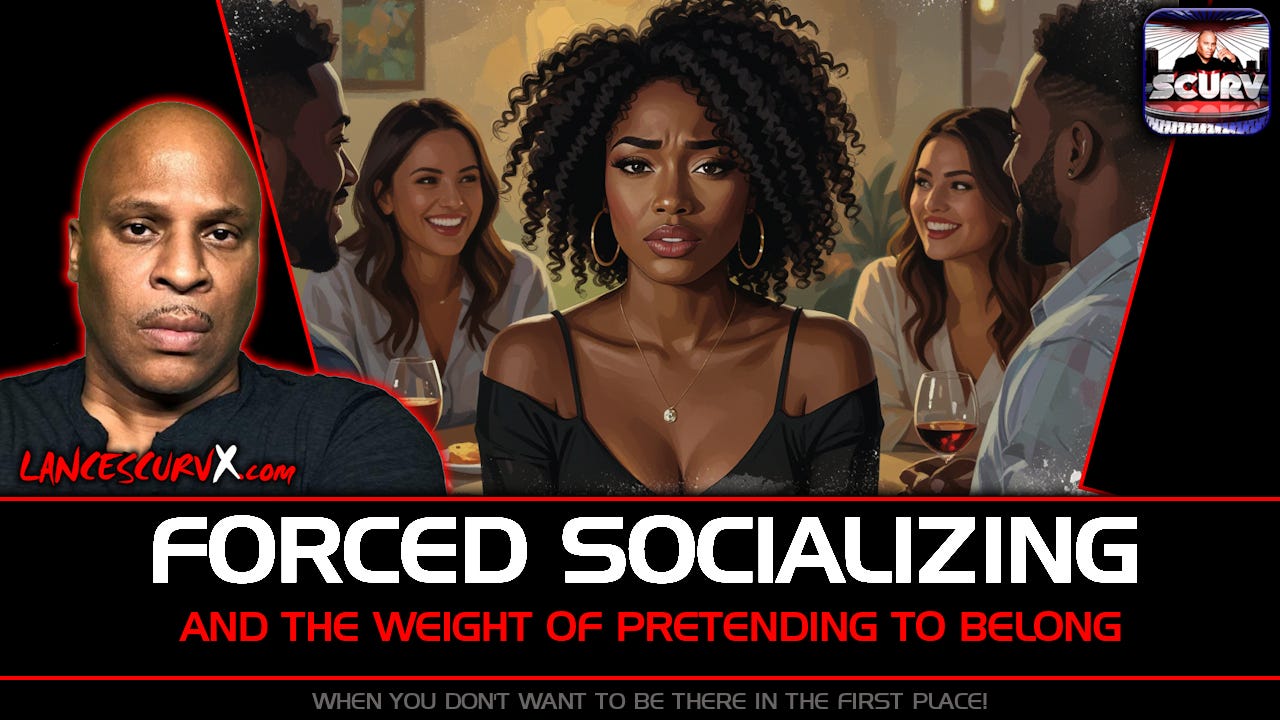FORCED SOCIALIZING AND THE WEIGHT OF PRETENDING TO BELONG...
WHEN YOU DON'T WANT TO BE THERE IN THE FIRST PLACE!
There comes a time when the silence of being alone feels like fresh air. After a long day, when the phone finally stops buzzing and the world grows quiet, you can breathe again. It’s in that stillness that you realize how much of your energy is spent pretending. Pretending to be okay, pretending to care, pretending that the noise around you doesn’t drain the life out of you.
But the truth is, for many of us, socializing doesn’t feel like connection anymore — it feels like work. We’ve learned how to smile when we’re tired, nod when we disagree, and perform when all we want is peace. It’s not because we hate people; it’s because being around them often means losing pieces of ourselves just to be accepted.
Family dinners, group chats, and work meetings have become stages where we play roles instead of being real. We wear the mask of “everything’s fine” even when our souls are begging for rest. The exhaustion isn’t physical — it’s emotional, spiritual, and heavy in ways that sleep can’t fix.
For the Black community, this weight carries an extra layer. We are expected to be strong, united, and unbothered — always smiling through struggle, always showing up, always proving that we’re okay. But behind closed doors, many of us are breaking under the pressure to perform strength while hiding pain.
We must talk about what it means to be human again. To be real. To stop performing and start healing. Because the truth is, pretending has become the silent poison of our time.
The Performance Trap
From the moment we are young, we are taught to play roles. In the family, we are told to respect elders, even when their words cut deep. At work, we are told to be “team players,” even when the team drains our energy. In friendships, we are told to always be available, even when we need to be alone.
This is what I call the performance trap — the constant pressure to be who others need instead of who we really are. Every “I’m fine” that hides pain. Every “no problem” that covers resentment. Every fake laugh that protects us from being judged as cold or distant. Over time, that pretending wears down the soul.
You see it at family gatherings where people smile through discomfort. You feel it in group chats where no one says what they truly think. You sense it at work when colleagues praise “team spirit” while quietly competing behind each other’s backs. And when you try to be real — to express how you truly feel — you’re told you’re being “too sensitive” or “too serious.”
This isn’t just social fatigue; it’s emotional suffocation. You’re forced to play a role every day — the strong one, the cheerful one, the reliable one — until you forget who you were before the act began.
The Family Pressure
Family is supposed to be love, safety, and truth. But sometimes, it becomes the heaviest cage. There’s guilt wrapped in every “We’re just checking on you.” There’s emotional control hidden behind “Don’t forget where you came from.” And for many in the Black community, family gatherings are not just reunions — they are emotional battlegrounds of expectation.
We’re told to show up no matter how we feel. To smile no matter what we’re going through. To perform gratitude even when we’re empty inside. When we try to take space, we’re labeled as ungrateful or distant. The phrase “family comes first” becomes a guilt trip, not a comfort.
In truth, some family members love the version of you that makes them feel comfortable, not the real you who’s evolving. Growth becomes rebellion. Independence becomes disrespect. And silence — your only form of protection — is misunderstood as arrogance.
The truth is, you can love your family and still need space from them. You can care deeply without constantly sacrificing your peace. True love doesn’t demand your exhaustion as proof.
Friends Who Don’t Grow With You
Friendship is supposed to be a safe space — a place to laugh, learn, and grow. But what happens when you start growing and your friends don’t? What happens when you begin healing, setting boundaries, and thinking differently, and they start to resent you for it?
Many of us have seen this shift. The jokes about you “changing.” The eye rolls when you talk about peace, purpose, or protecting your energy. They don’t realize it’s not that you’ve changed — it’s that you’ve awakened. And when you awaken, you can no longer feed the drama that once felt normal.
Within the Black community, this growth can be especially isolating. We often bond through shared pain — the struggle, the hustle, the survival stories. When one person starts seeking peace instead of chaos, it disrupts the unspoken agreement that we’re all supposed to suffer together. Some friends see your healing as betrayal because your peace reminds them of the healing they’ve avoided.
But growth will always expose who was really walking with you and who was only standing near you.
The Workplace Mask
Then there’s work — the place where professionalism becomes another form of pretending. “We’re like a family here,” they say, but that “family” only lasts as long as you fit the role they want you to play. In truth, many workplaces reward conformity and punish honesty.
You learn to keep your real opinions quiet. You learn to smile through unfairness. You learn to play the game just to survive. Especially for Black professionals, every word, every tone, every reaction is judged through a harsher lens. You must perform excellence just to be seen as equal — and even then, it’s never enough.
This kind of double performance — being professional and proving your worth in a biased world — drains the spirit faster than any workload. It’s not just about doing the job; it’s about protecting your peace in a place that demands your mask.
The Emotional Cost
All of this pretending adds up. You wake up tired, not from lack of sleep but from the weight of playing so many roles. You start forgetting what you enjoy because your energy is spent pleasing others. You start losing your voice because silence keeps the peace. And you start losing yourself because the world rewards your performance, not your truth.
This is not just burnout — it’s soul fatigue. It’s what happens when you trade authenticity for approval. When you’re constantly performing strength while your heart aches for rest. When every “yes” to others becomes a quiet “no” to yourself.
In our community, where strength is glorified, this is especially dangerous. We are taught to endure rather than express. To push through rather than pause. But endurance without healing becomes self-destruction in disguise.
Strategic Isolation: Protecting Your Peace
The only way to survive this world without losing yourself is to build mental solitude — a space within your mind where guilt, judgment, and manipulation can’t reach you. You don’t need to isolate from everyone; you just need to stop letting everyone’s expectations run your life.
You can love your family and still say “no.”
You can care for friends without fixing their chaos.
You can do your job well without letting it consume your identity.
Strategic isolation means observing without reacting. Seeing the manipulation and not absorbing it. Hearing the guilt and not accepting it. It’s choosing peace over performance, truth over tolerance.
In the Black community, we must learn that solitude isn’t selfish — it’s sacred. It’s where we heal from generations of forced smiling, silent pain, and survival performances. It’s where we remember who we are beyond the masks.
Awakening from the Act
Once you start seeing the truth — that most people are more comfortable with your mask than your honesty — you can’t go back. Awareness changes everything. You begin to notice who only calls when they need something. Who disappears when you set boundaries. Who praises your growth in public but undermines it in private.
It hurts at first, but then it frees you. Because real love doesn’t demand performance. Real friends celebrate your peace. Real family respects your boundaries. Anyone who needs you to be fake to feel close was never truly close at all.
The world doesn’t want awakened people; it wants obedient ones. But freedom begins the moment you stop performing and start living from your truth.
We are tired — not because we’re weak, but because we’ve been pretending for too long. Pretending to be strong, pretending to be fine, pretending that connection still feels real. It’s time to stop performing and start existing.
Solitude is not the enemy; it’s the medicine. Silence is not cold; it’s clarity. Choosing yourself is not selfish; it’s survival. Because every time you stop performing, you reclaim another piece of your soul.
In the Black community, we must begin to honor authenticity the same way we’ve honored strength. True strength is not in showing up for everyone — it’s in knowing when not to. It’s in protecting your peace without apology.
When we stop performing for acceptance, we begin to experience real connection — the kind that doesn’t require pretending, guilt, or exhaustion. We become whole again.
So yes, socializing feels like torture sometimes. But maybe that’s because you’ve outgrown the stage. Step off it. Sit in your silence. Breathe. The right people — the real ones — will meet you there.





🔥 Exactly 💯 👏🏽
Loving the truth folks still in denial even as whole protest and some unaware